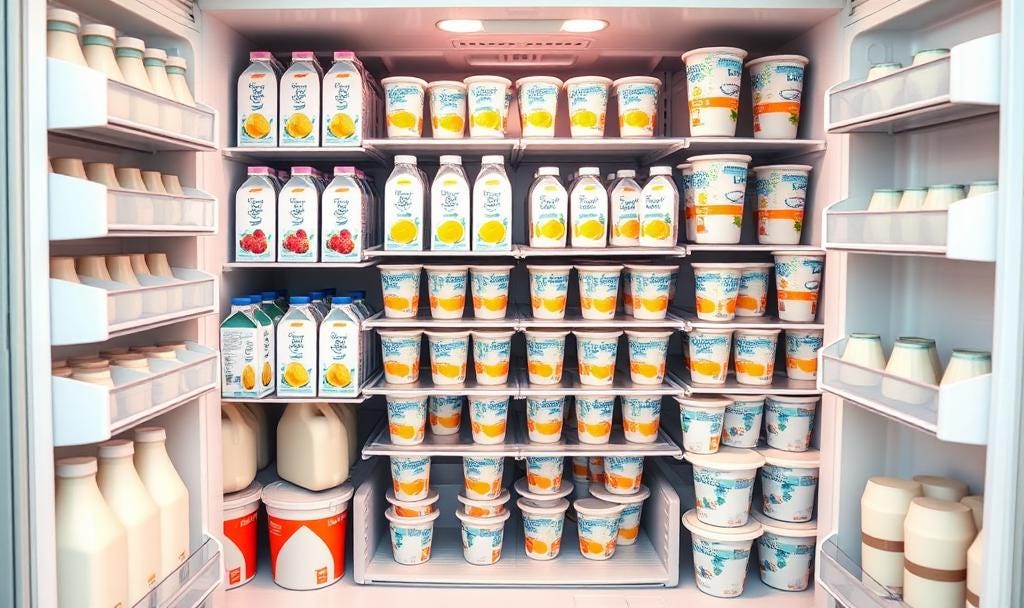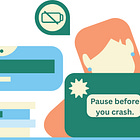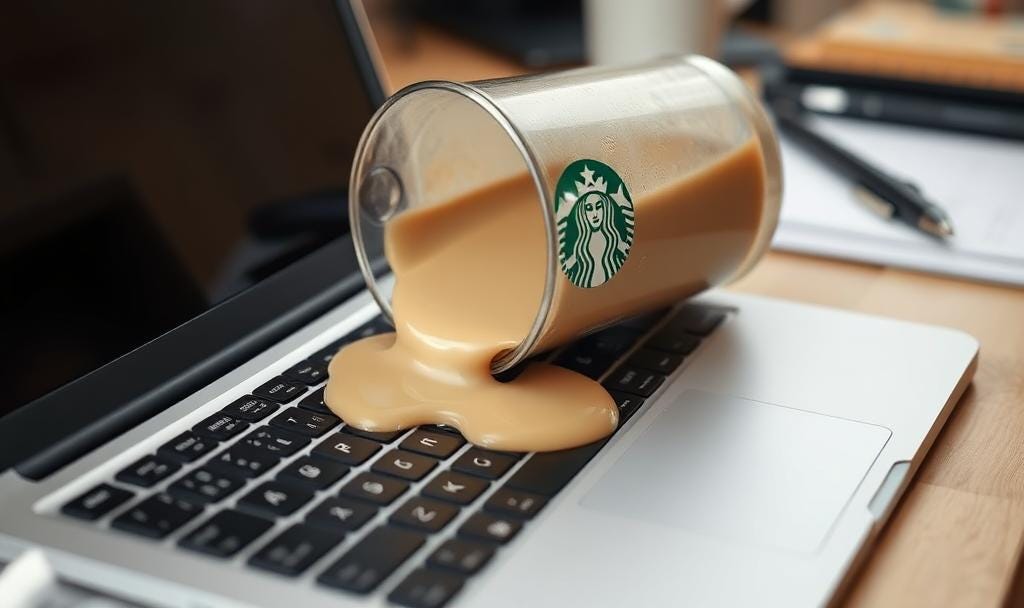Decision Fatigue Is Real, and No, It’s Not Just You
The sneaky brain drain you don’t notice until you’re halfway through a meltdown over almond milk.
Hey, checking in, because the quiet stuff matters too.
Today’s reflection: why your brain feels like it ran a marathon before lunch.
I was standing in my kitchen the other day, staring at the fridge like it was a Rubik’s Cube. Almond milk or oat milk? Strawberry non-fat Greek yogurt or plain? And why did choosing lunch suddenly feel like negotiating a United Nations treaty?
That’s when it hit me: I wasn’t hungry; I was exhausted. My brain was fried from all the tiny choices I’d made before even getting to the kitchen.
It’s called decision fatigue. And it’s sneakier than you think. This is how American Medical Association (AMA) describes it:
A state of mental overload that can impede a person’s ability to continue making decisions.
Every time we pick a route to work, scroll past an email, or decide what socks to wear, our mental energy ticks down like a silent timer. By the time the “big” decisions come — projects at work, tough conversations, career moves — we’re running on fumes, but still expected to perform like we’re fully charged.
Decision fatigue doesn’t scream. It whispers.
It shows up as irritability. Slight anxiety. Brain fog. Forgetting why you even walked into a room. You let autopilot take over, which helps efficiency… but chips away at emotional well-being. And the frustrating part? Most of us don’t even notice it until we’re halfway through a meltdown over almond milk.
Sometimes it feels like the day has already been lived before you’ve had your first real meal. You’ve answered a Slack, checked the weather, scanned your calendar, debated whether to fit in a workout, and adjusted a meeting time to accommodate someone else’s schedule — all before your second cup of coffee. That’s a lot of mental tabs open. (If my brain had a browser, by 10 a.m. there’d be 87 tabs, three frozen, two playing music I can’t find — and yes, I hoard physical tabs too.)
The tiny choices add up
It’s easy to underestimate the mental toll of small decisions; these are the tiny things that wear us down: snooze button or no snooze? Black coffee or latte? (Or both, if it’s one of those days.) Outfit A, B, or C? Check email now or later?
Each of these pulls from the same limited resource: mental energy. Simply Psychology calls this ego depletion; once your willpower is drained on one task, it’s harder to exert self-control on the next.
That’s why by 3 p.m., deciding between soup and salad can feel like launching a space shuttle. Or why you end up doomscrolling TikTok when you swore you’d be productive.
Your brain isn’t lazy; it’s depleted.
A quick brain science detour
Decision-making lives in the prefrontal cortex, your brain’s air traffic control tower. Every choice (big or small) burns glucose and oxygen, much like muscles burn fuel when you move. While it’s not a marathon’s worth of calories, the mental drain is real.
Overuse it, and your brain waves the white flag. That’s when you default to the easiest option (“Fine, pizza again”) or avoid decisions altogether (“I’ll just not eat and see what happens”).
This isn’t weakness; it’s wiring.

A tale of two days
On a low-choice day, you’ve laid out clothes, breakfast is on autopilot, your workday is structured into focus blocks, and dinner is prepped. By evening, you still have bandwidth to read, talk, or (luxury of luxuries) sit in silence.
On a high-choice day, you start with a closet full of clothes and no plan, juggle an unpredictable workday, answer every ping, and figure out dinner when you’re already starving. By bedtime, your brain feels like it’s been tumble-dried on high.
Same life lived. Different emotional outcome.
Why we keep piling on choices
We glorify “maximizing productivity” and “being in control.” Every decision feels like an optimization opportunity, but every choice chips away at calm, patience, and self-compassion.
Even wellness practices can backfire, especially when self-care starts to feel like work: Should I meditate, journal, or walk? Try a new app or stick to my old routine? More “helpful” choices, more mental load.
And consumer culture doesn’t help: 2,000 streaming shows, 47 kinds of toothpaste, endless colors of the same T-shirt. It’s like the world said, “We heard you like choices, so we put more choices in your choices so you can choose while you choose.” Yeah, it makes no sense. Neither does owning six nearly identical gray hoodies, but here we are.
How decision fatigue feels (from the inside)
For me, it shows up as:
Snapping over small things.
Misplacing my iPhone charger.
Feeling paralyzed by simple decisions (having an anxiety disorder doesn’t help)
Diving into distractions: snacks, scrolling, binge-watching… occasionally all three at once. (Yes, while writing this very piece)
It’s easy to blame yourself. But you’re not broken; just low on battery.
Gentle ways to protect your energy
Routinize the small stuff. Breakfast, outfits… not everything needs a daily debate.
Batch your decisions. Meal prep, weekly outfits, auto-bill pay (future you will thank you).
Offload. Delegate when you can. Say yes to help, no without guilt.
Save energy for what matters. Some choices deserve your brainpower. Most don’t.
Take micro-breaks. Even 5 minutes off-screen can reset your brain.
Simplify your inputs. Fewer apps, fewer feeds, fewer subscriptions.
Go for “good enough.” Perfection is expensive. (Recovering perfectionists, this one’s for you.)
Reframing: fewer choices, more freedom
There’s a myth that fewer choices equal less freedom. But the opposite can be true: less isn’t restrictive; it’s liberating. Automate lunch, and you have energy to decide how to use a free hour. Stop agonizing over the “optimal” workout, and you can actually enjoy the crisp air on your walk. It’s not about rigidity; it’s about saving fuel for what lights you up.
Why this matters
Decision fatigue isn’t just an inconvenience. When mental energy dips, patience, empathy, and creativity all suffer. Self-care and self-kindness get harder to maintain.
By noticing this invisible weight, you reclaim calm and clarity. Decision fatigue is real, subtle, exhausting; and not your fault. Sometimes the bravest choice isn’t the “productive” one, but the gentle one.
The next time your brain feels drained after a day of “small” choices, remember: you’ve been running a silent marathon. And the finish line isn’t a medal; it’s giving yourself permission to rest, simplify, and be human.
And… also because emotional healing isn’t always grand gestures, here’s a little honest check-in from me this week:
One thing that grounded me: found an extra fry at the bottom of the bag. It made my day.
One thing that ungrounded me: spilled a Starbucks latte all over my keyboard. Pissed me the f— off.
Your turn: what’s one small choice, grounding or ungrounding, that shifted your week?
If you’re new here, welcome to Joydify — your soft landing for the quiet stuff that matters.
Thanks for subscribing to Joydify and sharing a quiet moment with us. Here’s to gentle support, one check-in at a time.



